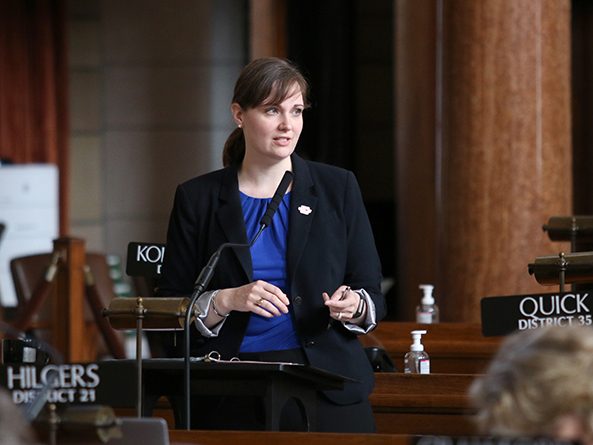Emancipation process for minors advanced
The Legislature advanced a bill March 7 that would allow certain minors to seek legal independence.

LB714, introduced by Omaha Sen. Sara Howard, would allow minors at least 16 years old to seek emancipation from their parents or guardians. Howard noted that the current age of majority in Nebraska is 19, but many teens move away from home and gain independence at 18.
There are many reasons a minor might seek emancipation, she said, but ultimately it is about ensuring the rights of mature, independent teenagers.
“There are many who seek to emancipate who have been on their own for a while and have supported themselves and don’t have the backing of an adult to make certain decisions like opening a checking account or buying a car,” Howard said.
After a motion to grant emancipation is filed and the individual’s parents or guardians have been notified, a judge would determine whether or not the minor possesses the maturity and knowledge to sufficiently manage his or her affairs and finances.
A Judiciary Committee amendment, adopted 34-0, would require that the court hold an initial hearing on the petition no sooner than 45 days after the petition is filed and no later than 60 days of filing. The petitioner would be required to notify his or her parent, legal guardian or nearest known relative residing in Nebraska of the hearing at least 30 days before the hearing date.
A parent or legal guardian could file an objection to the petition for emancipation within 30 days of receiving notice of the hearing.
If emancipation is granted, the minor legally would be allowed to incur debt, sign contracts, acquire property, file litigation, consent to medical services, enroll in any school or college and establish his or her own residence.
Emancipation status would not affect a minor’s status in any juvenile court proceedings.
Any person could file a motion to void an emancipation decision if the minor would become indigent or unable to financially support themselves or if the emancipation were obtained through fraud, misrepresentation or the withholding of relevant information.
Likewise, a minor would be allowed to file a written objection in response to any such petition to rescind an emancipation order.
Finally, the amended bill would clarify that in the event an emancipation order is rescinded, the parents or legal guardian would not legally be held liable for any debts incurred by the minor during the period of emancipation.
Senators advanced the bill to select file on a 35-0 vote.


